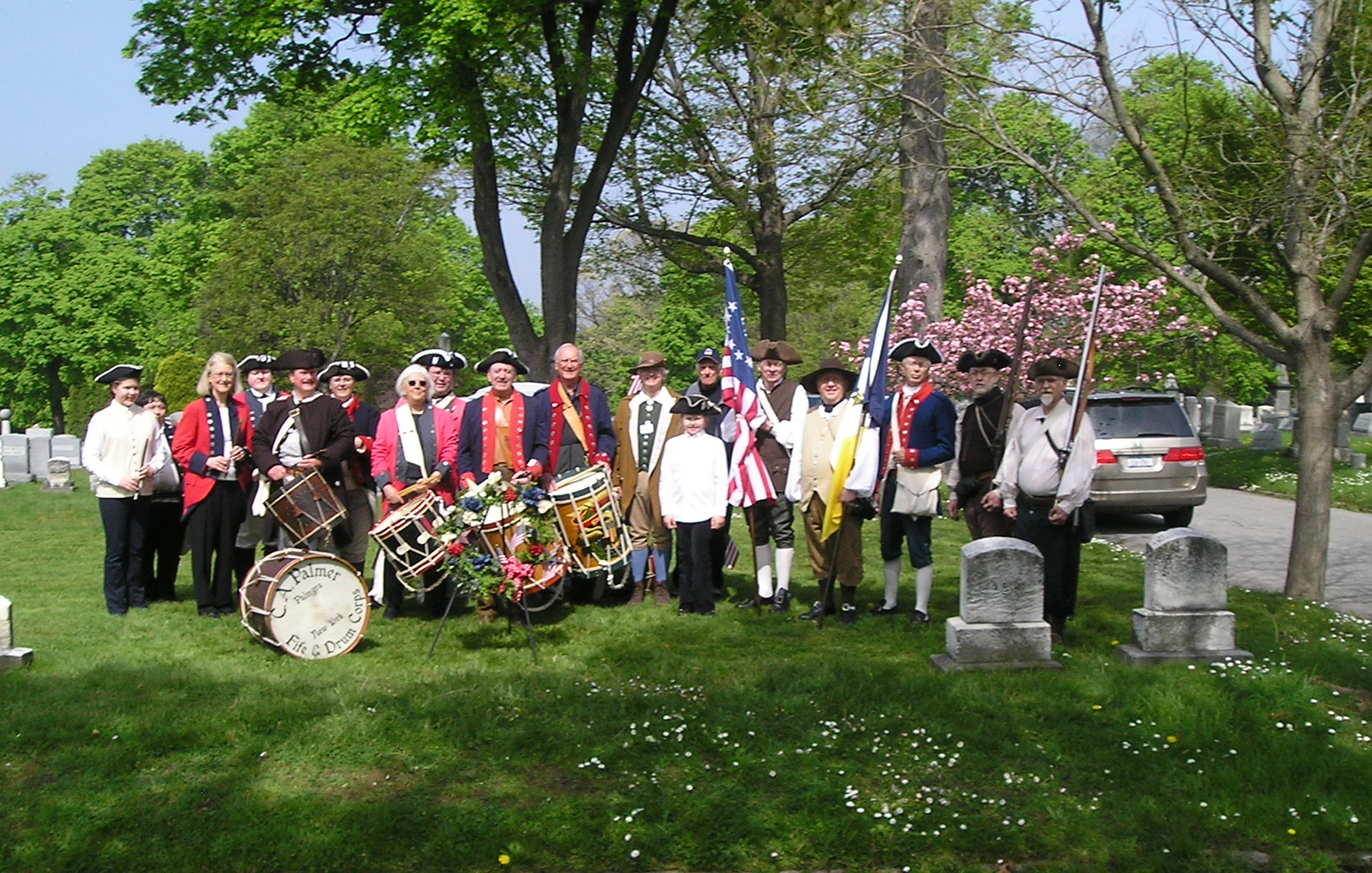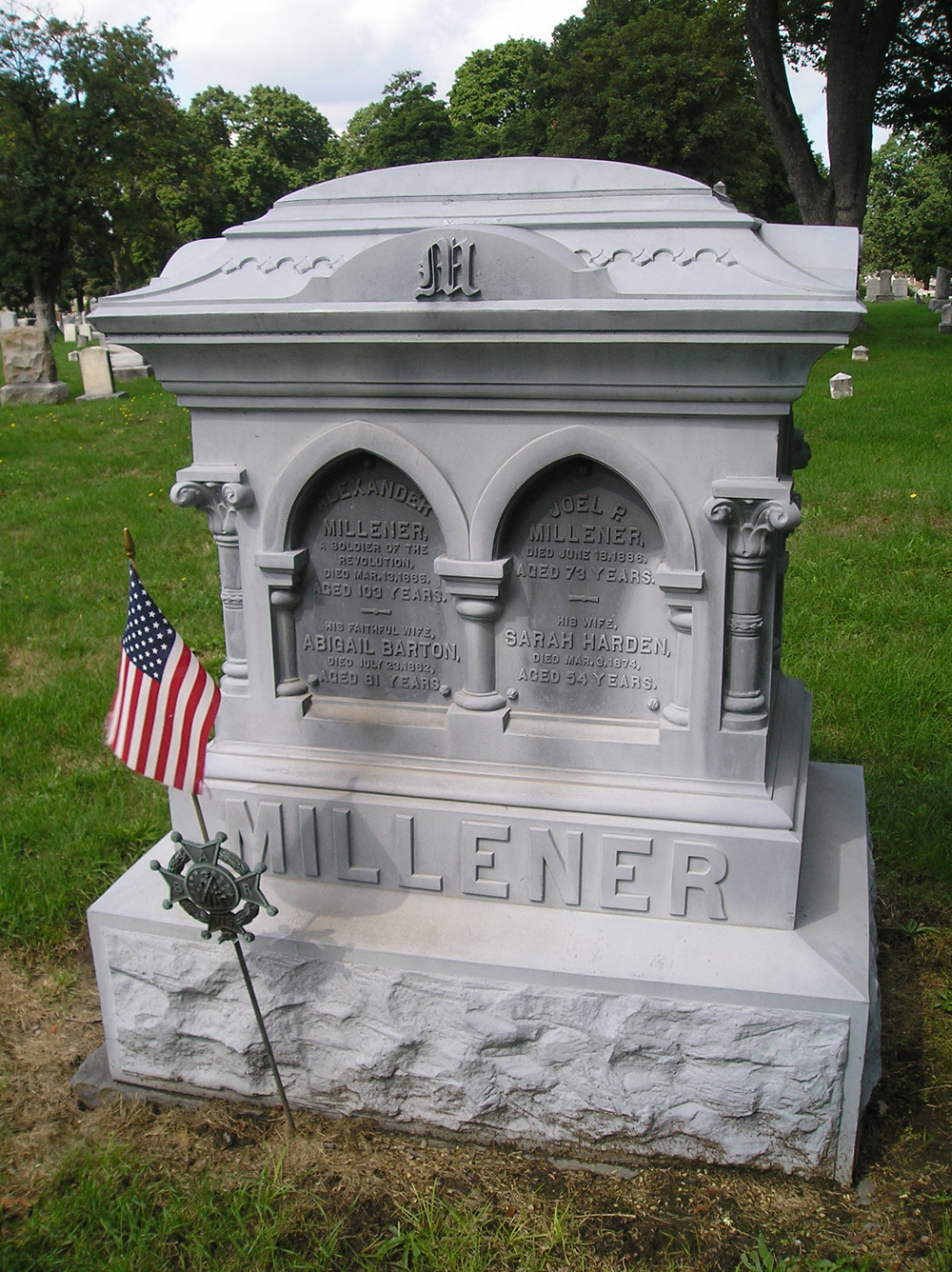The Story of George Washington’s Drummer Boy
Mount Hope Cemetery in Rochester, New York is the burial place of Alexander Millener, who served in the Continental Army as a drummer boy attached to George Washington’s Life Guard. After the War he was a farmer living at Adam’s Basin [now, Ogden, NY]. He died at the age of 103 in 1865 as the American Civil War was drawing to a close.
During the American Revolution he was present at the battles of White Plains, Brandywine, Saratoga, Monmouth and Yorktown. At Monmouth, New Jersey, he received a flesh wound in his thigh and almost died from the loss of blood. He survived that ordeal and later served in the Navy for 5-1/2-years through the War of 1812, including 3-years on the U.S. Constitution.
On May 3, 2012, as a preliminary public relations event for the Percussion Rochester festival, a short ceremony was held at Millener’s gravesite. In attendance were the C.A. Palmer Fife and Drum Corps under the direction of James P. (Jim) Smith, and members of the Sons of the American Revolution. Joining in on fife and drums were Jan Angus (Rochester Philharmonic flutist), John Beck (retired timpanist, Rochester Philharmonic and former Professor of Percussion at the Eastman School), Ruth Cahn (Eastman Community Music School), and myself. The event was covered by several reporters for local news publications.

The ceremony included fife and drum music of the type that would likely have been familiar to a drummer boy during the American Revolution – tunes such as “3-Camps,” “Pease Upon A Trencher”, “The Girl I Left Behind Me,” “The Roast Beef of Old England,” “God Save Great Washington,” and “To Anacreon In Heaven.”
The following text was read during the ceremony; it is derived from an interview with Alexander Millener published in 1864. To see the full interview go to : www.americanrevolution.org/last%20men/lastmen4.html
Alexander Millener was too young at the time of his enlistment to serve in the ranks, so he was enlisted as drummer boy; and in this capacity he served four years, in George Washington’s Life Guard. He was a favorite with the Commander-in-Chief, who used frequently, after the beating of the reveille, to pat him on the head and call him his boy. On one occasion, “a bitter cold morning,” Washington gave him a drink out of his flask. Millener’s recollection of Washington was distinct and vivid “{Washington] was a good man, He was always pleasant; never changed countenance, but wore the same in defeat and retreat as in victory.”
“One day the General sent for me to come up to headquarters. ‘Tell him,’ he sent word, ‘that he needn’t fetch his drum with him.’ I was glad of that. The Life Guard came out and paraded, and the roll was called. There was one Englishman, Bill Dorchester; the General said to him, ‘Come, Bill, play up this ‘ere Yorkshire tune.’ When he got through, the General told me to play. So I took the drum, braced her up, and played a tune. The General put his hand in his pocket and gave me three dollars; then one and another gave me more – so I made out well; in all, I got fifteen dollars. I was glad of it: my mother wanted some tea, and I got the poor old woman some.” (His mother accompanied the army as washerwoman, for the sake of being near her boy.)
Millener related the following anecdote of General Washington: “We were going. along one day, slow march, and came to where the boys were throwing stones. ‘Halt’ came the command. ‘Now, boys,’ said the General, ‘I will show you how to throw a stone.’ He beat ’em all. He smiled, but didn’t laugh out.”
Besides his service the army, Alexander. Millener served five and a half years in the navy. Three years of this service was on board the old frigate Constitution. He was in the action of February 20, 1814, in which the Constitution engaged two British ships, the Cyane and the Levant, capturing them both.
A drum belonging to Alexander Millener is on permanent display in Rochester, New York at the Hervey Eli Chapter House, which is maintained by the Irondequoit Chapter of the Daughters of the American Revolution,

